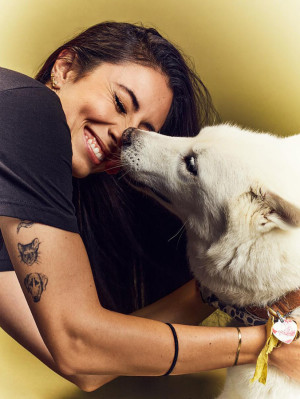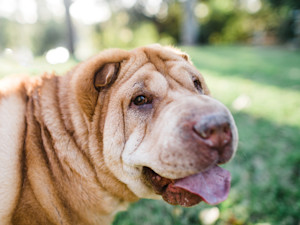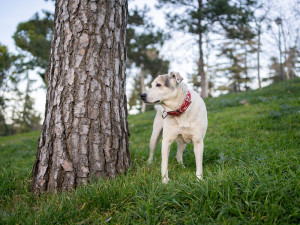The Game-Changing “Dog Aging Project” Is at Risk of Losing Funding
They are conducting trials on a drug that may extend dogs’ lives.

share article

Your pet wants you to read our newsletter. (Then give them a treat.)
In 2014, a group of scientists embarked on a mission: They wanted to investigate the effects of aging on dogs and find out how to best improve and extend the lives of senior pups. They called it the Dog Aging Projectopens in a new tab (DAP). Since receiving a five-year, nearly 29 million dollar grant from the National Institute on Aging (NIA) in 2018, the project has grown into a hugely successful and impactful organization, continually gathering new insights on aging that promise to lead to medical advances for both canines and humans. But now, the NIA may pull their funding, which could mean the end of the DAP.
The importance of the Dog Aging Project
In the past decade, the Dog Aging Project’s reach has been massive. Since 2018, they have registered almost 50,000 dogs to their database; each of these dogs' parents fill out an annual survey to track their pup’s aging. Many of them also provided biological samples of things like hair, urine, and feces. The group has published research on dog tumorsopens in a new tab, cognitive declineopens in a new tab, feeding schedulesopens in a new tab, and much more — and they’re currently conducting a clinical trial on rapamycin, a drug which may extend dogs’ lives.
Their research has major implications for both dogs and humans. “Dogs are probably the most powerful model for studying the biology of aging,” the DAP co-director Matt Kaeberlein told opens in a new tab. Many other aging projects have studied rodents, but dogs have much more in common with humans physically, including end-of-life ailments, such as dementiaopens in a new tab. They also live in much more similar environments to humans. This means the DAP’s work could ultimately hold the answers to questions about human aging that other researchers are far from answering.
“We will be asking, ‘How do dogs age healthfully?’ in order to help better understand how we can age healthfully, too,” Dr. Audrey Ruple, a veterinary epidemiologist and assistant professor at Purdue University College and a member of DAP’s research team, told The Wildestopens in a new tab in 2022.
The Dog Aging Project’s potential funding loss
Though the NIA has not yet commented on their decision, the DAP expects to lose funding in the upcoming year because their application didn't receive a high enough score in the first round of peer review to advance to the next stage. “The reviewers were asking how much we’d accomplished in five years,” Dr. Daniel Promislow, a co-director of DAP, told opens in a new tab. “Given the size of the project, I think the reviewers were wondering where the major papers are.”
The NIA has historically provided 90 percent of the DAP’s funding, so the loss of their support could risk the collapse of project. “I’m doing everything possible to keep [the project] going in its current form,” Dr. Promislow told Science.
According to many scientists (both participants and non-participants in DAP), it would be a huge mistake to pull funding at this stage in the game. “It takes you five years to start accumulating data,” dog geneticist Heather Huson of Cornell University, who is not involved with DAP, told Science. “The project is really just beginning to hit its stride,” added DAP's chief veterinary officer, Kate Creevy.
“It’s almost an emergency,” Stephanie Lederman, the executive director of the nonprofit American Federation for Aging Research, told the New York Times. “It’s one of the most important projects in the field right now.”
As for next steps, the Dog Aging Project is doing everything in their power to continue their work. DAP’s three founders have started a non-profit organization called the Dog Aging Instituteopens in a new tab, which they hope will raise money for their continued research and help other scientists who are studying dog aging. They are also circulating a petitionopens in a new tab calling for the NIA to reinstate their funding, which you can add your signature to now.

Sio Hornbuckle
Sio Hornbuckle is a writer living in New York City with their cat, Toni Collette.
Related articles
![A smiling veterinarian holding a cat]() opens in a new tab
opens in a new tabVets Are at High Risk For Compassion Fatigue—Here Are 4 Ways You Can Help
It’s extra important to be nice to the vet in your life.
![Celine Halioua, the founder of Loyal.]() opens in a new tab
opens in a new tabA New Drug Could Make Your Dog Live Longer—Meet the Woman Who Created It
The founder and CEO of Loyal, Celine Halioua, tells The Wildest what the future of pet parenthood could look like, starting with more time with your pup.
![Shar pei]() opens in a new tab
opens in a new tabLipomas in Dogs: Causes, Symptoms and Treatment of Fatty Tumors
Here’s why you (probably) shouldn’t worry.
![A senior white dog with arthritis wearing a red collar standing by a large tree in the grass outside]() opens in a new tab
opens in a new tabMedication For Dog Arthritis: Dog Arthritis Pain Management
Hope for dogs with arthritis is on the horizon.
![Cute girl and huge black great dane face to face in front of window at morning time.]() opens in a new tab
opens in a new tabA New Drug Aims to Extend the Life Expectancy of Large Dogs
The FDA determined it has a “reasonable expectation of effectiveness.”
![Woman holding ball while squatting next to a senior golden retriever dog.]() opens in a new tab
opens in a new tab7 Things You Should Know About Adopting a Senior Pet
A senior pet is the perfect addition to your family. Here’s everything you need to know before you bring them home.






